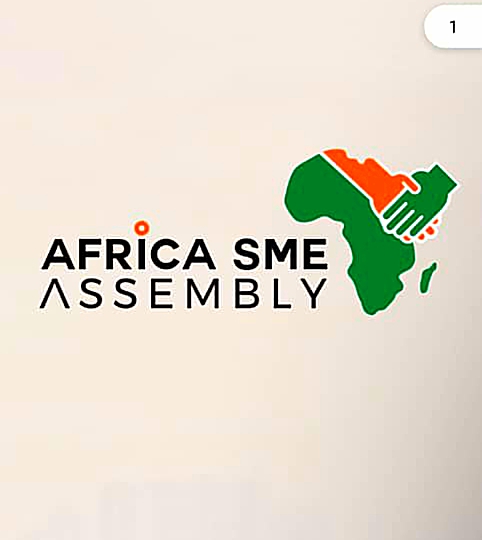
The Africa SME Assembly And The SMEs Revolution Impacted By Intelligence, Finance And Policy
By Hon. Minister Ebube George Ebisike
Successful entrepreneurs know that the best way to predict the future is to create it.” — Peter Drucker.

The Small and Medium Enterprise (SME) is the first unit and/or building block of corporate innovation in any sector within any economic system. Like a cell which is the building block of living organisms, multiples of cells growing in unison become a body actively alive with diverse capabilities. SMEs are similar to cells given that they represent the growth potential of a micro entity under the right conditions. SMEs are defined as enterprises which can range from Startups to thriving firms with less than 250 employees and an annual turnover of less than N500 million ($400,000). In Nigeria, SMEs are divided into micro, small, and medium enterprises based on their workforce and asset base.Based on Bigdata there were at least, 39,654,385 micro, small and medium enterprises (MSMEs) which operated in Nigeria as of December 2020 as against 41,543,028 million that were in existence in 2017, indicating a decrease of 4.5 %. In the last six years the decline of SMEs due to economic downturn in Nigeria from Covid19, internal government policies affecting ease of doing business, multiple taxation and insecurity has led to vast unemployment and holistically a reduction in GDP.
In South Africa, SMEs generate about 34% of the country’s GDP and employ approximately 60% of its workforce – crucial for economic diversification to new markets. On a larger scale, these organizations are key drivers of business activity in Sub-Saharan Africa, making up 90% of businesses, 50% of GDP and 80% of jobs.

To paint a clearer picture, Nigeria was home to over 36.9 million MSMEs, comprising 96.7% of all businesses in Nigeria. 67% of these businesses are youth-owned. MSMEs contribute over 45% to the country’s gross domestic product (GDP), with 98.8% of them in the micro cadre. They account for nearly 90% of the jobs in the country but all these gains have been eroded. It key to note that based on International Labor Organisation (ILO) data 80% of businesses fail in the first 5years. There four types of SMEs, with the most common types of SMEs being sole proprietorships, then there are partnerships, limited liability companies (LLCs), and corporations. Sole proprietorships are defined as the simplest form of business organization, and are typically owned and operated by a single individual.
In a survey once carried out India led with 63 million SMEs, though Indonesia is a close second with 62 million. However, when closely observed at the level of MSEs per 1,000 people, Indonesia and Nigeria were the top two, respectively. There are more micro-businesses than small ones in Nigeria and with a fledgling economy more downgrading of small businesses to micro has become the trend due to the impact of the petroleum subsidy removal on May 29th 2022, inflation and loss of value to the naira have also taken a toll on SMEs.
Using data from the World Bank, SMEs account for 60% of jobs in Africa, yet they operate in a cash-based economy where digital payment options are become more adopted. The challenge for SMEs in Africa is that they face about US$330 billion in financing gap. Besides that the frequent bad ratings by the global Big three rating agencies S&P 500, Moody and Finch means Africa loses over $60 billion annually in finance which is required to upgrade her infrastructure and operating environment for SMEs to thrive. Access to training, digital tools, the challenges in bridging R&D and industry, credit and resources of the fourth industrial revolution upon us means African SMEs are encumbered to key into the evolving knowledge economy for greater survival, resilience, sustainability and future competitiveness.
The sector with the highest concentration of SMEs in Nigeria
is the Wholesale/Retail Trade, Agriculture, and other services activities that make up 76.3% of micro enterprises.
The need for a holistic SME strategy in Africa is a silver bullet
and the African Union (AU) Small, and Medium Enterprises Strategy (SME) and Strategy and Master Plan, provides guidelines for promoting intra-regional and intra-African trade by integrating African MSMEs into regional and global value chains, this is also enabled by the Africa Continental Free Trade Agreement (AfCFTA).
Following from the above analysis the birth of the Africa SME Assembly (ASMEA) in cooperation with the State Of The African Diaspora (SOAD) and other partners is a stage to accret the
largest and most impactful gathering of SMEs in Africa. The event will also
mark the inauguration of the African SME Council (ASMEC). The tireless advocacy by CSOs and industry pundits for SMEs, Afri-capitalism and true economic emancipation is a
deeply resonating factor with the core values and objectives of their initiative. The
Africa SME Assembly (ASMEA) organisers aim to empower the continent’s economy by strengthening, digitizing and accelerating the growth of the highly informal and hugely underserved SME ecosystem. The ASMEA team of radical visionaries are led by Treasure Enyinnaya David
Cofounder & CEO, Innovative
Village, Convener, ASMEA, also Monalisa Agbata – Regional Marketing Head, CoinW, Co-convener & Head Of Marketing
Africa SME Assemby (ASMEA), with its mercurial CEO, Abaz Ibekwe who is
Cofounder, Techfield, he is also Co-convener & the ASMEA Project lead. The theme of the maiden edition is “Unlocking the full potential of African SMEs” the event is a Conference, Trade Fair, Exhibition, Networking and SME Awards billed for 29th and 30th of March 2024 at the J.F. Ade. Ajayi Auditorium (MainAuditorium), Akoka, Yaba, Lagos,
Nigeria with a heavyweight of industry professionals and experts to speak and educate on SMEs. The expected attendees is projected at 3000 physically seated and hundreds of thousands online.
The Africa SME Assembly (ASMEA) seeks to bring together key
stakeholders, investors, policymakers, and SME futurism to rebuild, and
renew the SME sector, fostering growth and creating an enabling ecosystem at a time hyperstagflation plagues the Nigerian economy and now Africa needs to reinforce inter-continental trade. The core projections of the ASMEA are to build an influential network of African SMEs and stakeholders, from within and outside the
continent to accelerate inclusive economic growth, to drive a conversation on innovation and fostering the digital transformation of the African SME sector.
To promote intra-continental and global trade in Africa by advocating for the advancement of the
intra-continental trade policy. Work towards bridging the gap between the operators of the SME (Small and Medium-sized Enterprises)
ecosystem, Entrepreneurs, Investors, Financiers, policymakers, Ecosystem builders, and technology
providers to foster a supportive environment for SME growth and sustainability and finally to execute the official launching of the Africa SME Council.
The ASMEA conveners in their message and work seek to drive the AfCFTA agreement which was adopted and opened for signature on 21 March 2018 in Kigali and entered into force on 30 May 2019 to it most optimized state of operability and sustainability. As at August 2023, 47 of the 54 signatories (87%) have deposited their instruments of AfCFTA ratification (ordered by date). Under the leadership of the Secretary General of AfCFTA Wamkele Mene African SMEs are expected to drive innovation, grow multibillion dollar trade exchanges driven by digital payment systems indigenously developed, create sustainable jobs, foster trade with the coming of BRICS bloc of countries, all whilst dedollarisation of the African economy becomes paramount and the use a united African currency comes to birth in the future starting with regional legal tenders.
Today virtually over 650 million mobile users exist across Africa based on World Bank data with 226.84 million of them in Nigeria based on information from
THE Nigerian Communications Commission (NCC) which released a new industry statistics indicating a rise in mobile subscriptions by 4.61 million to hit 226.84 million in 2022. The mobile enabled industrial revolution 4.0 for Africa SMEs is before us and must be taken advantage of. The need to grow SMEs or startups around the technology space is key to Africa especially around Energy, Hardware and Software. The growth of Fintech in Africa has been commendable thus far and more can be done.
To paint a picture the experimental and revolutionary achievement in the energy sector by the technologist Maxwell Sangulani Chikumbutso of Zimbabwe who runs Saith Limited with his partners. He undertook the journey into harnessing radio waves/Microsonic energy through research and development. Little did he know after suffering threats, arrests imprisonment, and harassments he would astound the world, breaking the existing barriers in terms of what can be patented and the hurdles of free energy machinery development. Maxwell Chikumbutso’s work has the capacity to power Africa’s infrastructural deficit and SME clusters into a $20 trillion economy in two decades of less, in other words overcoming Africa’s energy poverty. Microsonics offers the engineer and state a new way to control and manipulate energy. Among its virtues are miniaturization, reliability, and ease of device fabrication. Such revolutionary technology work needs to be unconventionally funded by our indigenous intelligence agencies to ensure Africa achieve a leap in technology frontiership. There are many African SMEs in Africa with indigenous cutting edge solutions to Africa’s development deficits who need to be given attention in terms of policy and investment. Many don’t know that Google and Facebook amongst other BigTech companies which were once SMEs or Startups were funded by the CIA though their venture capital arm InQtel.
The US Government and particularly thr CIA invests in companies to keep the Central Intelligence Agency, and other intelligence agencies, equipped with the latest in information technology in support of United States intelligence capability. The name “In-Q-Tel” is an intentional reference to Q, the fictional inventor who supplies technology to James Bond. Africa needs it’s own InQtels to unlock a new gap in talent, technology and tenacity for positive change and this is what the Africa SME Assembly reverberates.
From access to world-class talent, venture capital funding, established tech giants, and a supportive environment, silicon Valley provided the ideal setting for entrepreneurs looking to launch their businesses quickly and successfully.
In order to shape the success we seek in the Africa SME ecosystem let’s look at Silicon Valley.
It used to be nicknamed the Valley of Heart’s Delight. The region covers some 100 km², and its main city is San Jose, which now has a population of close to 1 million people. While people trace the birth of Silicon Valley back to 1939, the term “Silicon Valley” was not used until 1971. It key to note that Silicon Valley, which obviously is larger both in geographic area and in population — has 9.6% of California’s jobs and 13.1% of the state’s gross domestic product, versus 4.1% and 5.9% in San Francisco, respectively, for instance. The similarities between SMEs and startups as they are more known today in the entrepreneurial revolution in America elucidate the power of SMEs.
The Africa SME Assembly in partnership with SOAD is a transformative platform that aims to empower SMEs, unite stakeholders, and drive the growth of small
and medium-sized enterprises(SMEs) across the continent. It is
not just an event, it is movement with a promise to deliver it’s weight in present and future dividends for the SMEs on their journey to becoming Chaebols and Zaibatsu of Africa.
Hon. Minister Ebisike Ebube George is SOAD Minister Of Trade